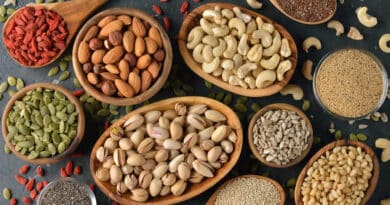Coffee

Coffee is a brewed drink prepared from roasted coffee beans, the seeds of berries from certain flowering plants in the Coffea genus. From the coffee fruit, the seeds are separated to produce a stable, raw product: unroasted green coffee. The seeds are then roasted, a process which transforms them into a consumable product: roasted coffee, which is ground into fine particles that are typically steeped in hot water before being filtered out, producing a cup of coffee.
Coffee is darkly colored, bitter, slightly acidic and has a stimulating effect in humans, primarily due to its caffeine content. It is one of the most popular drinks in the world and can be prepared and presented in a variety of ways (e.g., espresso, French press, caffè latte, or already-brewed canned coffee). It is usually served hot, although chilled or iced coffee is common. Sugar, sugar substitutes, milk or cream are often used to lessen the bitter taste or enhance the flavor. It may be served with coffee cake or another sweet dessert, like doughnuts. A commercial establishment that sells prepared coffee beverages is known as a coffeehouse or coffee shop. Clinical research indicates that moderate coffee consumption is benign or mildly beneficial as a stimulant in healthy adults, with continuing research on whether long-term consumption has positive or negative effects.
Coffee as a Commodity
The two most commonly grown coffee bean types are C. arabica and C. robusta. Coffee plants are cultivated in over 70 countries, primarily in the equatorial regions of the Americas, Southeast Asia, the Indian subcontinent, and Africa. As of 2018, Brazil was the leading grower of coffee beans, producing 35% of the world total. Coffee is a major export commodity as the leading legal agricultural export for numerous countries. It is one of the most valuable commodities exported by developing countries. Green, unroasted coffee is the most traded agricultural commodity and one of the most traded commodities overall, second only to petroleum.

Health Effects of Coffee
Researchers have looked at the benefits of drinking coffee for conditions such as diabetes, cardiovascular disease, inflammatory bowel disease, and liver disease. There is evidence to support some, but not all, of these claims. Coffee contains a number of useful nutrients, including riboflavin (vitamin B2), niacin (vitamin B3), magnesium, potassium, and various phenolic compounds, or antioxidants. Some experts suggest that these and other ingredients in coffee can benefit the human body in various ways.
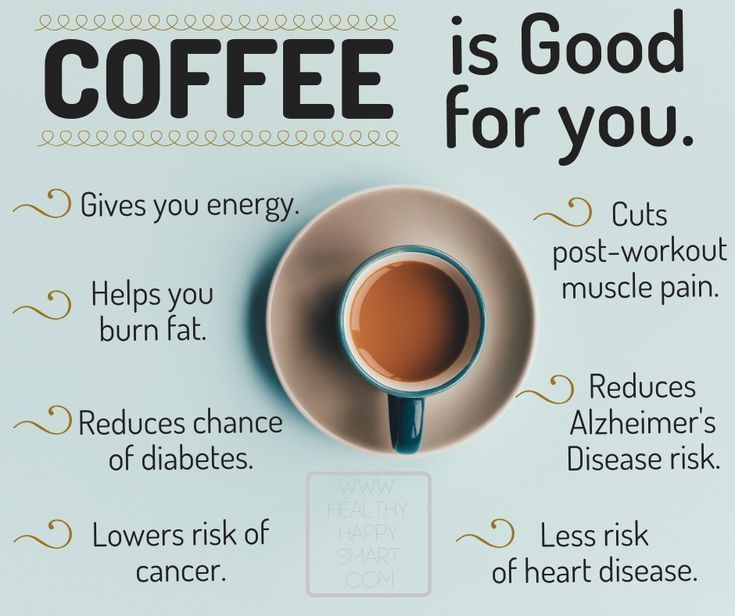
Some potential health benefits associated with drinking coffee include protection against type 2 diabetes, Parkinson’s disease, liver disease, and liver cancer. Coffee consumption may also support cardiovascular health.
Coffee and diabetes
Coffee may help protect against type 2 diabetes. In 2014, researchers who gathered data on over 48,000 people found that those who increased their coffee consumption by at least one cup per day over 4 years had an 11% lower risk of type 2 diabetes than those who did not increase their intake.
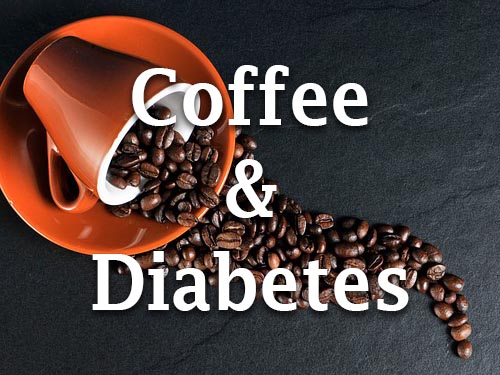
A 2017 meta-analysis concluded that people who drank four to six cups of either caffeinated or decaffeinated coffee each day appeared to have a lower risk of metabolic syndrome, including type 2 diabetes.
Coffee and Parkinson’s disease
Various studies have suggested that caffeine, which is present in coffee and many other beverages, may help protect against Parkinson’s disease.
One team concluded that men who drink over four cups of coffee per day might have a five fold lower risk of Parkinson’s disease than those who do not. The findings of the 2017 meta-analysis suggested a link between coffee consumption and a lower risk of Parkinson’s disease, even among people who smoke. This team also found that people who drink coffee may be less likely to experience depression and cognitive conditions such as Alzheimer’s disease.

However, there was not enough evidence to prove that drinking decaffeinated coffee helps prevent Parkinson’s disease.
Coffee and chronic liver disease or cancer
In 2019, a literature review concluded that coffee intake is likely to reduce the risk of liver cancer. Earlier, in 2015, a cohort study suggested that depending on the dose, consuming two to three cups of coffee daily reduced the participants’ risk of developing hepatocellular carcinoma and chronic liver disease (CLD) by 38% and 46%, respectively.
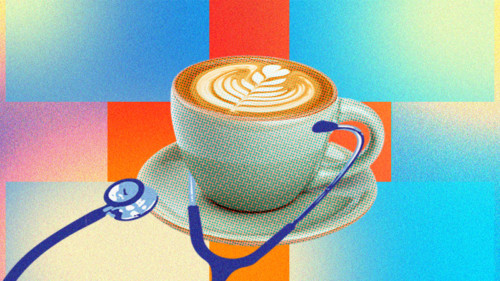
The meta-analysis from 2017 also concluded that consuming any type of coffee appears to reduce the risk of liver cancer, nonalcoholic fatty liver disease, and cirrhosis. These findings are now bolstered by a 2021 study suggesting that consuming all types of coffee may offer some protection against CLD.
Coffee and other liver diseases
People who consume coffee may also have a lower risk of gallstone disease. In 2014, researchers looked at coffee consumption among people with primary sclerosing cholangitis (PSC) and primary biliary cirrhosis (PBC). These are autoimmune conditions that affect the bile ducts in the liver. They found that people with PSC were more likely to have a lower coffee intake than those without the condition. There was no evidence to suggest that coffee intake was different among people with or without PBC.
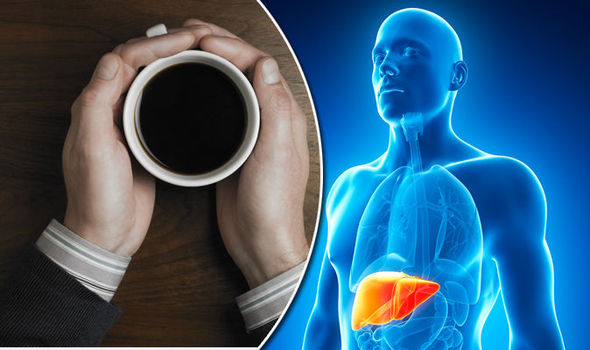
Also, another 2014 study suggested a link between coffee consumption and a lower risk of dying from non viral hepatitis-related cirrhosis. The researchers suggested that drinking two or more cups of coffee every day might reduce the risk by 66%.
Coffee and heart health
The 2017 meta-analysis found that caffeine consumption may have at least a small benefit for cardiovascular health, including blood pressure.
In a 2018 study, researchers found that drinking three to five cups of coffee per day may reduce the risk of cardiovascular disease by 15%. Drinking one to five cups daily also seemed to be associated with lower overall mortality resulting from any cause.

For those people who have already experienced a heart attack, drinking coffee does not appear to increase their risk of experiencing another or dying as a result.
The 2017 meta-analysis, however, also found that there may be higher levels of blood lipids (fat) and cholesterol in people who consume more coffee. These substances may predispose a person to heart problems.
Coffee and obesity
There is some evidence suggesting that consuming coffee may help people lose weight. One 2018 paper indicated that the more coffee the participants drank, the higher their mean reduction in weight, body mass index (BMI), and fat mass.

A 2019 study suggested that drinking coffee may have a modest association with weight loss, with a greater association in men than in women. However, these results have not been replicated, so they may not be definitive.
Although coffee may provide some benefits in reducing obesity, it is not a substitute for eating a balanced diet and exercising often.
Nutritional Value of Coffee
One hundred milliliters of regular black coffee (without milk or cream) is low in calories. That is about one typical cup of black coffee, and it only contains around 2 calories. However, adding cream or sugar will increase the calorific value.
Coffee beans also contain polyphenols, which are a type of antioxidant. Antioxidants can help protect the body against free radical damage. Free radicals are a type of waste product that the body naturally produces as a result of certain processes.

Free radicals act as toxins in the body and may cause inflammation. Scientists have found links between inflammation and various aspects of metabolic syndrome, including type 2 diabetes and obesity.
In 2018, some researchers suggested that the antioxidant content of coffee may offer protection from metabolic syndrome.
Although scientists can prove that certain compounds are present in coffee beans, it remains unclear what happens to them once they enter the human body.
Risks
Drinking a lot of coffee can also have some adverse effects. These may include the following.
Bone fractures
Some studies have suggested that women who drink a lot of coffee may have a higher risk of bone fractures.
Men with a higher coffee intake, on the other hand, appear to have a slightly lower risk.
Complications during pregnancy

Coffee consumption may also not be safe during pregnancy. In fact, there is some evidence to suggest a link between high coffee consumption and pregnancy loss, low birth weight, and preterm birth.
Endometriosis
There may be a higher risk of endometriosis among women who drink coffee, but there is not enough evidence to confirm such a link.
Gastroesophageal reflux disease
People who drink a lot of coffee may have a slightly higher risk of this condition.
Anxiety
Consuming high amounts of caffeine may increase the risk of anxiety, especially among people with panic disorder or social anxiety disorder. Less commonly, caffeine may trigger mania and psychosis in those who are susceptible.
Mental health conditions
One study from 2016 concluded that a high intake of caffeine during adolescence could lead to permanent changes in the brain.
The scientists behind the study expressed concern that this could increase the risk of anxiety-related conditions in adulthood.
Exposure to toxic ingredients
In 2015, a group of researchers found relatively high levels of mycotoxins in commercial coffee. Mycotoxins are toxic substances that can contaminate coffee as a natural product.
Some people worry that acrylamide, which is another chemical present in coffee, may be dangerous.
Side effects
Although consuming caffeine may offer some benefits, there can be negative side effects if a person drinks too much of it. These side effects may include:

- adverse interactions with particular, medications such as certain psychiatric drugs, thyroid medications, heartburn drugs, and antibiotics
- possible spinal bone loss in women who drink more than 300 milligrams (mg) per day and who do not consume enough calcium
- gastrointestinal problems
- an increase in blood pressure
- an increase in the risk of myocardial ischemia, which is a type of heart disease, if a person consumes coffee during exercise
- fertility difficulties
- negative effects on a growing fetus, such as low birth weight, if a person consumes a large amount of coffee during pregnancy
- irritability and insomnia in nursing infants, if a person consumes coffee during lactation
- dehydration, but this is not conclusive and may be limited to excessive caffeine consumption
- worsened symptoms of certain mental health conditions, such as schizophrenia or bipolar disorder
- an increased risk of suicide
- coffee-specific disorders, which include:
- caffeine intoxication (or overdose)
- caffeine-induced anxiety disorder
- caffeine-induced sleep disorder (or insomnia)
- caffeine-related disorder not otherwise specified



